新疆兵团五师86团一中:Unit7 Where would you like to visit(第5课时)教案(人教新目标九年级全册)
Unit 7《where would you like to visit》课件5(15页)(人教新目标九年级)

yunnan
T: Where would you like to visit? S: I hope to go to Yunnan. T: Why? S: Because I like places where the weather is always warm.
pottery soldiers
Where would you like to visit?
I’d love to visit Xi’an.
Why?
Because I like places where they are educational.
Because I like places where we can learn some Chinese
Why?
Because I like places where the beaches are fascinating.
Where would you like to visit?
I’d love to visit Mexico.
Why?
Because I like places where the people are friendly.
history.
Guilin
Where would you like to visit?
I’d love to viFra bibliotekit Guilin.
Why?
Because I like places where they are peaceful.
T: Where would you like to go on vacation? S: I would like to go to _______ . T: Why? S: Because I like places where _____.
unit 7 where would you like to visit 教案(人教新目标初三) (7)doc初中英语 (1)
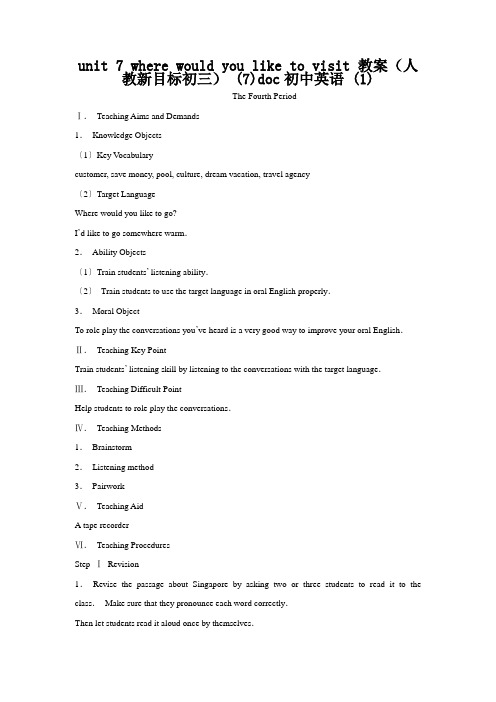
unit 7 where would you like to visit 教案(人教新目标初三) (7)doc初中英语 (1)The Fourth PeriodⅠ.Teaching Aims and Demands1.Knowledge Objects〔1〕Key Vocabularycustomer, save money, pool, culture, dream vacation, travel agency〔2〕Target LanguageWhere would you like to go?I’d like to go somewhere warm.2.Ability Objects〔1〕Train students’ listening ability.〔2〕Train students to use the target language in oral English properly.3.Moral ObjectTo role play the conversations you’ve heard is a very good way to improve your oral English.Ⅱ.Teaching Key PointTrain students’ listening skill by listening to the conversations with the target language.Ⅲ.Teaching Difficult PointHelp students to role play the conversations.Ⅳ.Teaching Methods1.Brainstorm2.Listening method3.PairworkⅤ.Teaching AidA tape recorderⅥ.Teaching ProceduresStep ⅠRevision1.Revise the passage about Singapore by asking two or three students to read it to the class.Make sure that they pronounce each word correctly.Then let students read it aloud once by themselves.2.Check the short compositions they have written at home.First let several ones read theirs to the class.Second, get them to work in pairs to check the compositions.At last, collect all students’ compositions.Go over them carefully after class.Step ⅡPart 1This activity reviews the target language and introduces new vocabulary.Read the instructions to students.Explain brainstorm like this:Brainstorm a list of things means you should write down all the ideas that come into your minds.Now brainstorm a list of things that are important to you when you go on vacation.Write them down in your exercise books.You should not worry if an idea is silly or if a word is spelled wrong.You can even write a word in their first language for the moment.Ask them to have a look at the two model phrases the book provides before they begin.Move around the room offering language support as needed.After about three minutes, tell them to stop writing and thinking.Let’s review the ideas you’ve thought of together.We will correct spelling and find the correct English words for any words you don’t know.Then ask some children to read their lists to the class.Write any new words or phrases they have used on the blackboard.Ask them to discuss the lists in groups of four.Each one reads his or her own list to the other three.Then they discuss the words or phrases together.If there is something that they are not sure, tell them to show me by putting up their hands.Move around the room and solve the problems they may have.Help students find the correct English words to express their ideas.Step Ⅲ2aRead the instructions to students.Tell them to guess the meaning of travel agency first.Then explain it like this:If you plan to have a trip or vacation, you can go to a travel agency.A travel agency is an office that can help you make travel plans.Also they help you get plane tickets and hotel reservations.Then present whale watch and amusement park to the class like below.A whale watch tour means you stay in a ship and go out to the ocean during the time of year when the whales are migrating, then you can see them traveling.Amusement park means a place like Disneyland.You can do lots of rides and play lots of games there.Write the two phrases on the blackboard.Look at the three pictures in Activity 2a now.We know Jeff has a summer job at a travel agency.We will hear him talking on the phone with three different people.Can you see the small box in the corner of each picture? Listen to the conversations and number the pictures.Write a proper number in each box to show the right order of the pictures.Then play the tape for the first time.Tell them only to listen.Play the tape a second time.As they listen to the tape this time, have the students number the pictures.Check the answers.Step Ⅳ2bRead the instructions to the children.Tell them to look at the chart.Then read the headings Customer, Wants, Doesn’t want and point out the blanks under each one.And let them see the sample answer under Wants in the chart.Ask them to read it together.Say, Then first customer wants to go somewhere warm.I’ll play the recording again.Please write down the things the three customers want and don’t want in this chart as you listen to the recording.The play the recording again.Students fill in the blanks with the words they hear.Pause the tape several times to give students time to fill out the chart.Correct the answers.Step Ⅴ2cThis activity provides guided oral practice using the target language.Read the instructions to the children.Say, In this activity, you are asked to role play Jeff’s conversation with the information in the chart in Activity 2b.Ask a pair of students to read the sample conversation to the class.Offer more phrases,…to go to a small town,…to go by ship,…to go to a place which is too crowded, …to travel by plane,…to go to anywhere too far, ect.Write them on the blackboard.Then ask students to practice in pairs.Move around the room checking the progress of the pairs and offering help as needed.Ask one or two pairs to say their conversations to the class.Correct any mistakes they may have made.Step ⅥSummarySay, In this class, we’ve done lots of listening practice on target language, and we’ve also written and spoken some.Step ⅦHomework1.Write out the phrases you have brainstormed in Activity 1.2.Write down the conversation in Activity 2c.Step ⅧBlackboard Design。
Unit 7 Where would you like to visit-教学设计
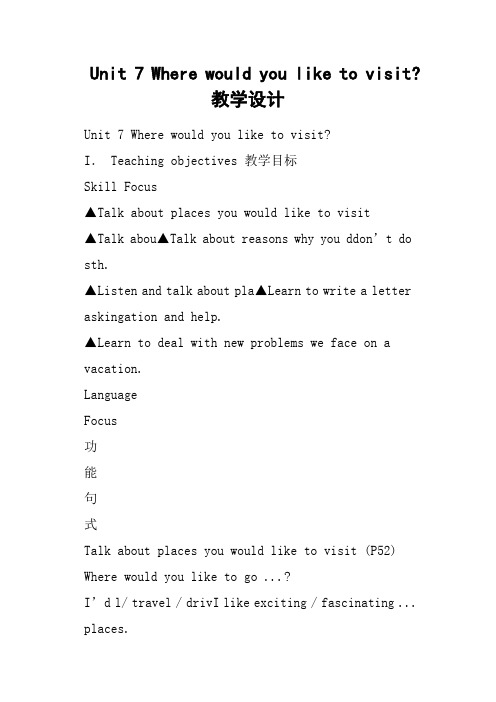
Unit 7 Where would you like to visit?教学设计Unit 7 Where would you like to visit?I. Teaching objectives 教学目标Skill Focus▲Talk about places you would like to visit▲Talk abou▲Talk about reasons why you ddon’t do sth.▲Listen and talk about pla▲Learn to write a letter askingation and help.▲Learn to deal with new problems we face on a vacation.LanguageFocus功能句式Talk about places you would like to visit (P52) Where would you like to go ...?I’d l/ travel / drivI like exciting / fascinating ... places.Talk abouand suggestions(P53-54)IIvI’d love to gWder visiting ...?Talk about reasons why you (don’t) vlaces (P54)It doesn’t have any beauntaThe traavaandv/ crowded / dangerous / expensive ...But it’s also beautiful, and ...词汇1. 重点词汇educational, fall, lively, church, wine, translate, light, wonderful, provide, sail, Pagramming2. 认读词汇tiring, peaceful, fascinating, thrilling, FloridaAmazon, Niagara Falls, touligdl Tower, Notre Dame Cathedral, convunderground, general, unless, pauciual, findingule, translalusion, attitude3. 词组take it easy, in general, provide with, as soon as possiblue语法Would andxpressing dI’d like to go somewhererelaxing.Igo to </st1:country-regategyFocus1. Classifying information by filling2. Role playing Culture Focuaround the world.II. Teaching materials analyzing and rearranging 教材分析和重组1. 教材分析本单元以Vacations为话题,共设计了四个部分的内容:A该部分有4个模块:第一模块围绕Where would you like to go on vacation? 这一话题展开写()、听(1b)、说()训练;第二模块围绕and the difficulties we would meet when traveling进行听(, 2b)、说()训练;第三模块继续就上两个模块中的travel places这一话题展开训练,训练形式为给出景点特征的形容词或名词,模仿本单元的句型对话(, 3b);第四模块是对话训练,通过描述景点的优缺点谈论自己对旅游景点的审美情趣(4)。
Unit 7 Where would you like to visit (全单元5课时)
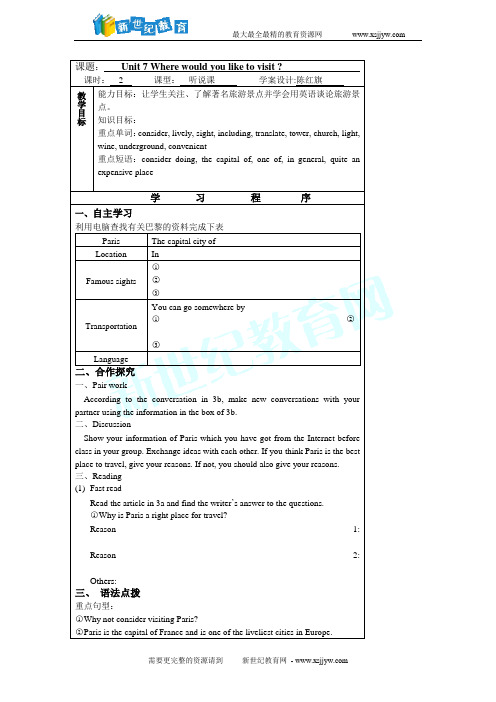
课题:Unit 7 Where would you like to visit ?课时: 2 课型:听说课学案设计:陈红旗教学目标能力目标:让学生关注、了解著名旅游景点并学会用英语谈论旅游景点。
知识目标:重点单词:consider, lively, sight, including, translate, tower, church, light, wine, underground, convenient重点短语:consider doing, the capital of, one of, in general, quite an expensive place学习程序一、自主学习利用电脑查找有关巴黎的资料完成下表Paris The capital city of _____________Location In _____________Famous sights ○1__________________________○2__________________________ ○3__________________________Transportation You can go somewhere by○1__________________________○2 __________________________○3__________________________Language二、合作探究一、Pair workAccording to the conversation in 3b, make new conversations with your partner using the information in the box of 3b.二、DiscussionShow your information of Paris which you have got from the Internet before class in your group. Exchange ideas with each other. If you think Paris is the best place to travel, give your reasons. If not, you should also give your reasons.三、Reading(1)Fast readRead the article in 3a and find the writer’s answer to the questions.○1Why is Paris a right place for travel?Reason 1: ____________________________________________________Reason 2: ____________________________________________________Others:_____________________________________________________ 三、语法点拨重点句型:○1Why not consider visiting Paris?○2Paris is the capital of France and is one of the liveliest cities in Europe.○3Unless you speak French yourself, it’s best to travel with someone who can translate things for you.四、精讲释疑五、Why not consider visiting Paris?为什么不考虑到巴黎去旅游?1、Paris is the capital of France and is one of the liveliest cities inEurope.巴黎是法国首都而且是欧洲最有活力的城市之一。
九年级英语全册 Unit 7 Where would you like to visit?Reading教案 人教新目标版
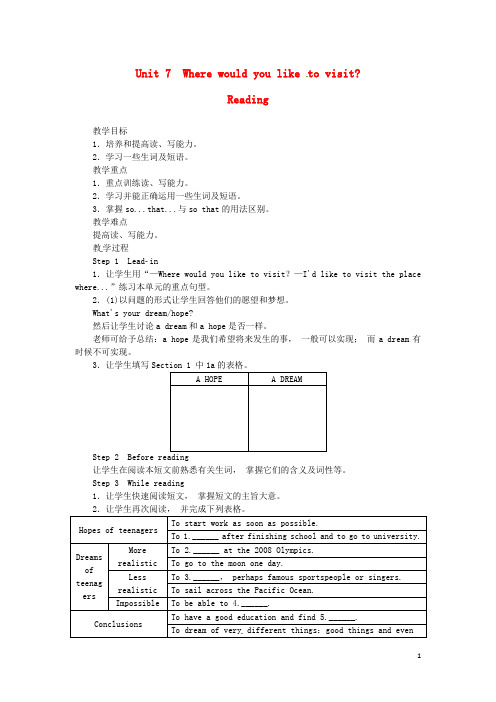
Unit 7 Where would you like to visit?Reading教学目标1.培养和提高读、写能力。
2.学习一些生词及短语。
教学重点1.重点训练读、写能力。
2.学习并能正确运用一些生词及短语。
3.掌握so...that...与so that的用法区别。
教学难点提高读、写能力。
教学过程Step 1 Leadin1.让学生用“—Where would you like to visit?—I'd like to visit the place where...”练习本单元的重点句型。
2.(1)以问题的形式让学生回答他们的愿望和梦想。
What's your dream/hope?然后让学生讨论a dream和a hope是否一样。
老师可给予总结:a hope是我们希望将来发生的事,一般可以实现;而a dream有时候不可实现。
3.让学生填写Section 1 中1a的表格。
A HOPE A DREAMStep 2 Before reading让学生在阅读本短文前熟悉有关生词,掌握它们的含义及词性等。
Step 3 While reading1.让学生快速阅读短文,掌握短文的主旨大意。
Hopes of teenagers To start work as soon as possible.To 1.______ after finishing school and to go to university.Dreams of teenag ersMorerealisticTo 2.______ at the 2008 Olympics.To go to the moon one day.LessrealisticTo 3.______, perhaps famous sportspeople or singers.To sail across the Pacific Ocean.Impossible To be able to 4.______.Conclusions To have a good education and find 5.______.To dream of very different things:good things and evencrazy things.老师核对答案:1.continue studying 2.be volunteers 3.become famous 4.fly 5.a good job3.让学生细读短文,找出短文中的重难点句子,老师进行讲解。
《Unit 7 Where would you like to visit?》教案(3)
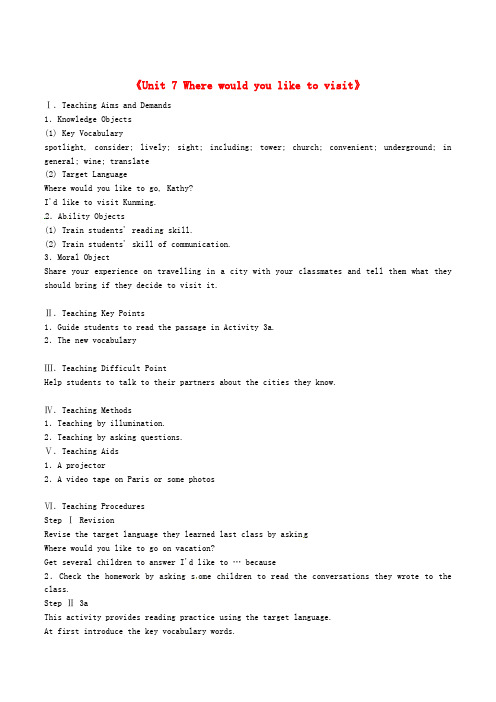
《Unit 7 Where would you like to visit》Ⅰ.Teaching Aims and Demands1.Knowledge Objects(1) Key Vocabularyspotlight, consider; lively; sight; including; tower; church; convenient; underground; in general; wine; translate(2) Target LanguageWhere would you like to go, Kathy?I'd like to visit Kunming.2.Ab ility Objects(1) Train students' readi ng skill.(2) Train students' skill of communication.3.Moral ObjectShare your experience on travelling in a city with your classmates and tell them what they should bring if they decide to visit it.Ⅱ.Teaching Key Points1.Guide students to read the passage in Activity 3a.2.The new vocabularyⅢ.Teaching Difficult PointHelp students to talk to their partners about the cities they know.Ⅳ.Teaching Methods1.Teaching by illumination.2.Teaching by asking questions.Ⅴ.Teaching Aids1.A projector2.A video tape on Paris or some photosⅥ.Teaching ProceduresStep Ⅰ RevisionRevise the target language they learned last class by askin gWhere would you like to go on vacation?Get several children to answer I'd like to … because2.Check the homework by asking s ome children to read the conversations they wrote to the class.Step Ⅱ 3aThis activity provides reading practice using the target language.At first introduce the key vocabulary words.Show the key vocabulary words on the screen by a projector.spotlight, consider; lively; sight; including; tower; church; convenient; underground; in general; wine; translateTeach students to read the vocabulary several times until they can read them out easily and correctly.Read the passage quickly and try to answer the questions on the blackboard.Write these questions on the blackboard:1.What doesn't Paris have?2.What does Paris have?3.Is Paris also a wonderful place for shopping?4.What don't you plan on doing in Paris ? Why?5.What is best to do in Paris ?A few minutes later(maybe two or three minutes) , ask different students to answer the questions.Play the video tape of Paris for students or show them some pictures .Next, read the instructions to students.Say, What things do you like about visiting Paris and what things don't you like? Read the passage again. Circle the things you like about visiting Paris and underline the things you don't like.Get them to finish the activity on t heir own. Check the answers.Step Ⅲ 3bThis activity provides reading, listening and speaking practice using the target language. Read the instructions to students. Make sure that they know what to do.Ask two students to read the sample conversation on the left in Activity 3b,SA: Where would you like to go, Kathy?SB: I'd like to visit Kunming.SA: Isn't it supposed to be very hot?SB: Yes, it is. But it's also beautiful, and it has lots of i nteresting museums.Note to correct any pronunciation errors to make sure the students are providing a good model for the rest of the class.Step Ⅵ SummaryIn this class, we've learned something about Paris. We've done a lot of listening, speaking, reading and writing practice using the target language.Step Ⅶ Homework1.Read the passage again and again.2.Try to remember the new words on page 54.Blackb oard DesignUnit 7 Where would you like to visit?Section AThe Third Peri odQuestions to Activity 3a:1.What doesn't Paris have?2.What does Paris have?3.Is Paris also a wonderful place for shopping? 4.What don't you plan on doing in Paris? Why? 5.What is best to do in Paris教学反思:。
Unit7 where would you like to visit教学设计
Language Event
四、教学过程( Teaching Process)
Procedures
Teacher'sactivities
Students'activities
Aims
Medium
Warm-up
1.Look some picturesandaskthequestions:
6. Read the questions and discuss in groups.
6.引导学生对文本进行深层阅读和理解,通过回答问题培养学生反思阅读的能力,同时也通过阅读获得介绍一个地方的思路和结构。
ppt,
Step 3
Post-reading
1. Ask Ss to make a brief introduction abouthometownwith the help of the information on the handouts, and give instructions.
2. Read the paragraphs quickly and tell the main ideas.
3. Ask Ss to read thepassager again and complete the table.
3.Read and complete the table
4. Ask Ss to work in pairs to make dialogues according to the information in the
二、教学分析
教学内容分析
本节课的教学内容源于人教版教材《新目标英语》九年级年级Unit7where would you like to visit?的内容,为第七单元的第二课时,是一节阅读课。本课主要围绕“Why not consider visiting Paris?”展开话题,其中涉及语言知识及风景和文化习俗的学习。为了更好地兼顾学情需要,本课从教学内容上对教材进行了提炼与整合,主要体现在读前的推测,读中的理解、运用,读后的拓展阅读材料上,拓展阅读材料涉及本地的主要景点、人文特性、气候、语言等内容,学生通过自主阅读,小组合作,全班展示等活动,不仅提高了阅读能力,还培养学生热爱家乡。
九年级英语全册 Unit 7 Where would you like to visit?The Fifth Period教案 人教新目标版
Unit 7 Where would you like to visit?The Fifth PeriodⅠ.Teaching Aims and Demands1.Knowledge Objects(1) Key Vocabulary:provide, firm, offer, spot, Confucius, stele, forest(2) Reading practice using the target language(3) Writing practice using the target language2.Ability Objects(1) Train students' reading skill.(2) Train students' writing skill.(3) Train students' listening and speaking skills.3.Moral ObjectAre you planning to take a trip this summer? Write an e-mail to a travel agency in English to get some information on vacations.Ⅱ.Teaching Key Points:1.The new vocabulary.2.Read an e-mail.3.Write an e-mail.Ⅲ.Teaching Difficult Point:Write an e-mail.Ⅳ.Teaching Methods1.Scanning the e-mail to find out the answers2.Writing3.GroupworkⅤ.Teaching Aids1.Some pictures of Qufu, the Great Wall and the Forest of Steles in Xi'an2.A projectorⅥ.Teaching ProceduresStep Ⅰ Revision1.Revise the conversation in Activity 2c on page 55 by making a conversation with one student like this,T: Where would you like to go?S: I'd like to go somewhere relaxing.T: What else can you tell me?S: I don't want to go to big noisy cities.After that. ask them to practice in pairs.Ask several pairs to share their conversations with the whole class.2.Check their homework. First, choose some students to read the phrases on Activity 1. Second, ask several ones to read the conversations they wrote to the class. Correct the mistakes that they may have made with the whole class. Get them to work in pairs to help each other. Tell them to show their homework to each other, and help correct any mistakes they may have made.Step Ⅱ 3aThis activity provides reading practice using the target language.At first, introduce the key vocabulary words. Show the key vocabulary words on the screen by a projector.Provide v.提供;供给firm n.公司offer v.提供;给予spot n.地点;场所Confucius 孔子(公元前551~前479年,春秋末期思想家,教育家)stele n. (pl. stelae) 石碑;石柱forest n.森林;森林地带The Forest of Steles 碑林(位于陕西西安)Teach students to read the words and expressions several times. Then ask several to read to the class. Make sure that they can read the words fluently and correctly. Read the instructions to students. Do some explanation. Make sure that each student knows what they will have to do.Go over the statements about the e-mail message with the whole class. Make sure that they can understand all the six sentences in the box. And tell them to put the six statements in their minds while they scan the e-mail below.Say, Boys and girls, please scan the e-mail in Activity 3a now. Try to get the main idea of theletter and find out the answers to the statements. Ask them to scan the letter individually, and write T, F or DK before each statement.After they've all finished scanning, check the answers with the whole class. Elicit why the, false sentences are false at the same time.After checking the answers, tell the children to read the passage more carefully and prepare to answer the questions on the blackboard.Write the questions below on the blackboard:1.Where do S. T. Zhang and the family want to take a trip?(Somewhere in the east of China.)2.What kind of place do they want to go to?(An exciting place where they can do lots of exercise.)3.What exercise do they especially love doing?(They especially love hiking and swimming.)4.What does S. T. Zhang say about the hotel they want to live in?(They need to stay in an inexpensive hotel. And they wish their hotel had rooms with kitchens so that they could save money by cooking their own meals. The room needs to be big enough for three people. And they'd like to stay at a place with a big pool or somewhere near the ocean.)5.What does S. T. Zhang want the travel agency to do?(Give them some suggestions for vacation sports and let them know if it's best to travel by plane, train or bus.)6.How long would they like to be away?(About three weeks.)After they've all finished reading, get some students to answer these questions.Encourage them to ask questions on what they don't understand about the e-mail.Ask one student to read the letter to the class. Help him or her with the pronunciation. Then (et all the students read the passage several times.Answers:1.F(the family wants an inexpensive hotel and wants to save money by cooking) 2.F(the'family enjoys hiking and swimming) 3.DK4.DK5.T6.F(the person wants to go to the east of China) Step Ⅲ 3bThis activity provides writing practice using the target language.Read the instructions to students.Ask: Who can explain the instructions in your own language?Choose two or three among those who have put up their hands to explain the instructions in English.They may say like this, Suppose I work for Ace Travel Agency and I have received the letter from S. T. Zhang. Then it is my duty to reply the e-mail and I have to tell where they should go on vacation.After they all know what to do, get them to begin writing. Move around the classroom as they write, offering help if necessary. Remember whose passage is excellent and prepare to ask them to read theirs to the class.After they've all finished writing, ask the students who have written very good passages to read theirs to the class.Let them work in pairs to correct the mistakes in the passage they've written. Tell them that they have to rewrite the letters after class and bring them to school tomorrow.Step Ⅳ Part 4This activity provides reading, writing, listening and speaking practice using the target language.Read the instructions to students.Say something about the three places in the chart. Showing some pictures of these places to the students, say like this, Qufu is a small city in Shandong Province. It is famous for Confucius. It was Confucius' hometown. He was born there.The Great Wall is the pride of the Chinese people. It is very long and it is hard to believe that it was built over two thousand years ago.The Forest of Steles in Xi'an is a great place for people who are interested in writing Chinese with brushes. What do you think of the three places? Look at the chart in Activity 4. We can see the sample answer in the box about Qufu in the column of you.Continue saying, Now please fill in the boxes about The Great Wall and The Forest of Steles in Xi'anon your own. You can use the words above the chart or any other word.Tell them to write out the three students' names in the proper places in the chart. Then get them to survey the three students. Let them work in groups of four.Ask a pair of students to read the model conversation in Activity 4 before they begin their own ones.At last, have several groups report the results to the class. Then ask the class where they would prefer to go together.Step Ⅴ SummaryIn this class, we've read an e-mail to a travel agency and we've also written an e-mail. And we've done some reading, writing, listening and speaking practice using the target language through group work.Step Ⅵ Homework1.Rewrite the e-mail which you wrote in class.2.Try to remember the new words and expressions on page 56.Step Ⅶ Blackboard DesignUnit 7 Where would you like to visit?Section BThe Fifth PeriodAnswers to Activity 3a:1.F 2.F 3.DK 4.DK 5.T 6.FQuestions on the e-mail in Activity 3a:1.Where do S. T. Zhang and the family want to take a trip?2.What kind of place do they want to go to?3.What exercise do they especially love doing?4.What does S. T. Zhang say about the hotel they want to live in?5.What does S. T. Zhang want the travel agency to do?6.How long would they like to be away?。
教学设计-Unit 7 Where would you like to visit 示范教案 6th period
The Sixth Period Ⅰ. Teaching Aims and Demands 1. Knowledge Objects (1)Key Vocabulary surf, arctic (2) Use the following words properly hope, pack, save, provide, cook (3) Write an article using the target language. 2. Ability Objects (1)Train students to use the verbs hope, pack, save, provide and cook well. (2)Train students’ writing skill. 3. Moral Object Do you want to travel abroad? English will be very useful for you then. It is spoken all over the world. Ⅱ. Teaching Key Points 1. Help students have a self check on the key words and target language. 2. Practice using the verbs. hope, pack, save, provide, cook 3. Write an article. Ⅲ. Teaching Difficult Points 1. Use the verbs hope, pack, save, provide and cook. 2. Write the article. Ⅳ. Teaching Methods 1. Teaching by making sentences. 2. Teaching by writing. Ⅴ. Teaching Aid The pictures of the four places Ⅵ. Teaching Procedures Step ⅠRevision 1. Check the homework by asking students to show their e-mails. Choose several to read theirs to the class. Then let them work in pairs and read their own letters to the partners. At last, collect all the letters. 2. Have a dictation to see if they can remember the new vocabulary which they learned last class. Dictate the following ones. provide, firm, offer, spot. the Forest of Steles, Confucius Step Ⅱ Part This activity focuses on vocabulary introduced in the unit. Focus attention on the box. Invite a student to read the vocabulary words at the top. You are asked to fill in the blanks with the words. In some cases, you may need to use another form of the word, for example, adjusting for tense or subject/verb agreement. Ask students to fill in the blanks on their own. Check the answers. Five students each read a sentence, filling in the blanks. The rest of the students check their work. Answers 1. provide 2. cook 3. saving 4. pack 5. hope Ask students to make their own sentences with the words, preferably sentences that are meaningful. Move around the room. Collect a few students’ answers with mistakes on the blackboard. Along with the students help correct the mistakes. Sample answers 1. My family hope to go to Sydney soon. 2. He is packing all his clothes. He will leave for London tomorrow. 3. We’d better save time for study. 4. The hotel provides breakfast for free. 5. Many foreigners can cook dumplings. Step Ⅲ 2 This activity provides reading and writing practice using the target language. Read the instructions to the class. Get them to look at the pictures. Say, Can you say out the English names of the four famous places in the pictures? Ask some students who know that to tell the names. Write the four names on the blackboard: the Golden Gate Bridge in San Francisco, the Sydney Opera House, Big Ben in London, the Eiffel Tower in Paris. Then teach them to read the names several times till they can read them fluently and correctly. Practice reading the names by showing some pictures of the four places to students. Get them to say out the English names of the places as soon as they see each picture. Change the pictures more and more quickly and students do as fast as they can. After practicing the names, ask, Which these places would you like to visit most? Why? Ask two or three students to tell their answers to the class. They may say like this, I’d like to visit Paris most. Because I cam see the famous tower, the Eiffel Tower. there. And I have ever heard the people there are very romantic. I’m interested in that. Then say, Please say something on the place where you would like to visit most to your partner now. Get them to work in pairs. Move around the room as they work, offering words and sentences as needed. After they’ve all finished, tell them to write an article about where they would like to visit most and why. Ask students to complete the work on their own. Move around the classroom and help them. After they’ve finished writing, ask a few students to read their articles to the class. Encourage the rest of the class to tell the mistakes they may have made in their passages. Work in pairs. Each one reads their own passage to the partner. Help correct any mistakes in the passage.
英语:unit 7《where would you like to visit》教案(1)(人教新目标九年级).doc
英语:Unit 7《Where would you like to visit》教案(1)(人教新目标九年级)tiring [′taIrI]adj.引起疲劳的;累人的【词析】音析:元音字母i读[aI]和[I]。
形析:tire(v.疲劳)+ -ing(形容词后缀)义析:making you feel that you want to rest or sleep【例句】Typing(打字)is tiringeasily.打字很容易引起人的疲劳。
【辨析】tiring和tired二者都为形容词,tiring常用于修饰事物,指令人疲劳的;tired常用于修饰人,指“感到疲劳的”,其常用词组be tiredof表示“对……感到厌倦”。
如:She is tired of farm work.她对农活感到厌倦了。
educational[edj′keInl]adj.教育的;有教育意义的【词析】音析:字母组合tion读[n],tion前面的a通常读[eI]。
形析:education(n.教育)+ -al(……的)义析:of or relating toeducation【例句】This film is very educational.这部影片很有教育意义。
【拓展】同根词:educate v.教育,训练;education n.教育,训练;educationist n.教育家peaceful [′pi sfl]adj.平静的;宁静的;和平的【词析】音析:字母组合ea读[i],ful中的u读[],注意不要读成[]。
形析:peace(n.和平)+ ful(形容词后缀)义析:undisturbed by strive(斗争),turmoil(骚动),or disagreement(争论)【例句】China is a peaceful nation.中国是一个热爱和平的国家。
【拓展】1)同根词:peace n. 和平,和平时期;peaceable adj.和平的,息事宁人的;peaceably adv.和平地,息事宁人地;peacefully adv.和平地,平静地,安宁地,太平地;peacefulness n.和平,安宁2)常用词组: keep the peace维持治安;make peace with跟……讲和fascinating[′fsIneItI]adj.迷人的;有极大吸引力的【词析】音析:两个字母a的读音分别为[]和[eI]。
- 1、下载文档前请自行甄别文档内容的完整性,平台不提供额外的编辑、内容补充、找答案等附加服务。
- 2、"仅部分预览"的文档,不可在线预览部分如存在完整性等问题,可反馈申请退款(可完整预览的文档不适用该条件!)。
- 3、如文档侵犯您的权益,请联系客服反馈,我们会尽快为您处理(人工客服工作时间:9:00-18:30)。
According to finishing some tasks of reading ,to train students’ ability of identify main idea,and to train students’ ability of reading for special information.
情感态度价值观
Take action to achieve our dream.
学情分析
教学分析
教学重点
Key vocabulary.
Read the text to identify main idea.
Read the text to understand words in context.
教学
2.Ask for ideas that will help this person achieve this dream.
3.Write down a dream they have and talk about how they will achieve their dream.
Step 3 Summary
hope ,dream
教学过程设计(第课时)
教学环节
教师活动
学生活动
教学媒体
预期效果
Step1. Warm-up
Before you read,
Ⅰ.1aThink of an example of a hope and a dream ,discuss the difference between a hope and a dream .
2.Give them 2minutes to discuss each of the three questions .
3.Ask for a show of hands for“yes”and“no”to Questions3.
Ⅴ.Section 4 Gotudents to read out the example dream.
难点
难点
Train students’reading skill.
解决办法
教学资源
A tape recorder , CAI
板书设计
Unit 7 Where would you like to visit?
The Fifth Period
I’d love to sail across the Pacific.
4.What example is given of an impossible dream?
Ⅲ.3cCheck the answers.
Ⅳ.3d.
1.Divide the class into discussion groups of a maximum of six students each.
Ⅱ.1b Ask some questions:
1.What’s your dream?
2.How do you achieve your dream?
Step2. Presentation
While you read
Ⅰ.3a
1.Ask the students to go through the reading slowly, underline points they want to know .
2.Extension
continue doing sth.= go on doing
eg: The rain continued falling all afternoon.
hold on to doing sth.
Ⅱ.3b Read it again and answer some questions:
1.Why do some students want to work as soon as possible?:
2,What’s important to students about the work they do?
3.What’s the most popular choice of job?
通过问题方式激发学生兴趣,导入新课。
独立完成阅读理解,完成相应的阅读任务,培养学生自主探究的精神
调查身边的学生,提高学生的口语表达能力,以及现实生活中的语言交际能力。
鼓励学生努力实现自己的美好愿望。
教学设计评价
Look at the reading and check answers.
Discuss each of the three questions and tell the classmate if their dream have come true.
Write down a dream and talk about how to achieve the dream.
课堂教学设计
年级:八年级单位:八十六团第一中学授课教师:
设计要素
设计内容
教学内容分析
1、
教学目标
知识与技能
Key Vocabulary
sail, Pacific, thousands of , as soon as possible, continue, programming, report, quite a few, dream of, hold on to, attitude, be willing to, translator, conclusion
Discuss the difference between a hope and a dream, then answer some questions.
Understanding the article and underline points they want to know .
Read it again and answer some questions.
